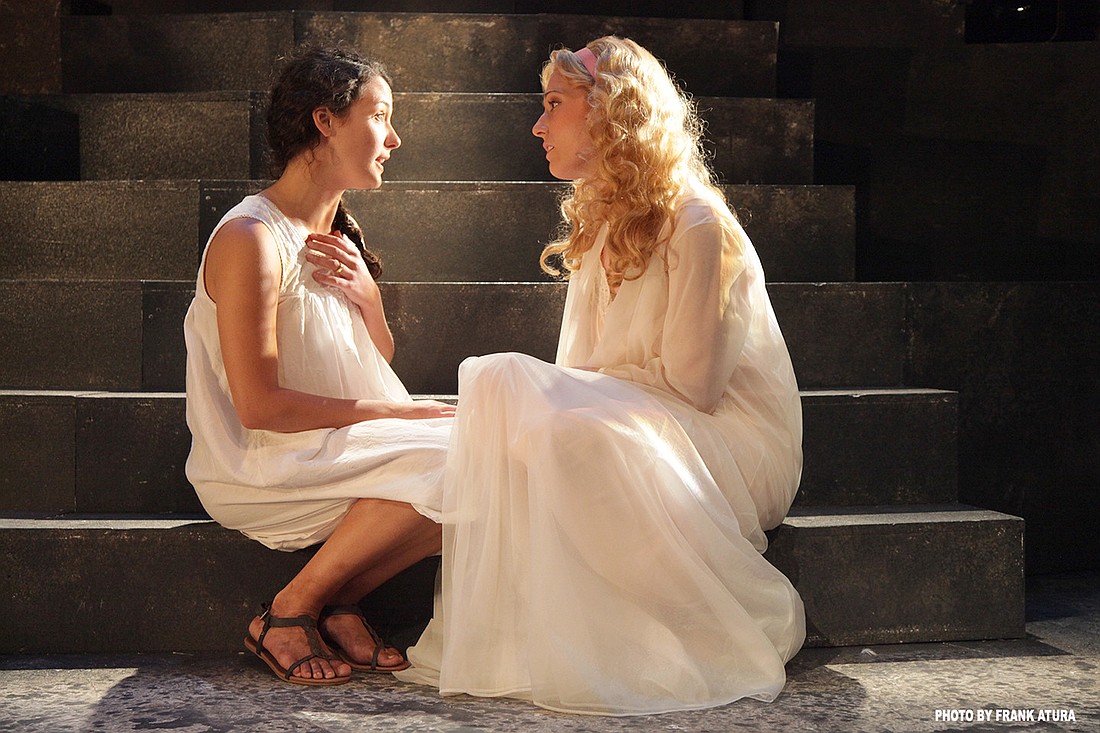- April 19, 2024
-
-
Loading

Loading

Jean Anouilh’s “Antigone” is a visionary play about the nature of power and freedom. That nice-sounding, English major phrase probably conjures up an image in your mind. Whatever it is, forget it. Like any truly visionary play, it overturns conventional notions. You can see what I’m talking about at the FSU/Asolo Conservatory’s current production.
Anouilh’s source material is, of course, the Greek tragedy. Sophocles’ original is as free of ambiguity as a cloudless, noonday Greek sky. After a civil war, King Creon refuses to bury Antigone’s brother, Polynices — and threatens death to anyone who tries. Without proper burial, Polynices’ soul will not find rest. Antigone (Creon’s niece) rights this violation of divine law by breaking human law. She buries her brother’s body and pays with her life. It’s just that simple. But Anouilh’s 1944 update is anything but. The playwright keeps the plot, but gives the characters inner lives. That changes everything.
Antigone (Andrea Adnoff) is, by turns, a mad prophetess, wounded animal and punk princess. She gets all the best speeches. (Anouilh is equal parts poet and playwright.) Antigone’s words of fire dazzle — in a fiery performance by Adnoff. The play loads the dice and gets you on her side. Then a voice in your head says, “Hang on. Is she right — or right mad?” You start to question Antigone’s righteous road to doom.
Subversively and subtly, Anouilh makes you doubt her blind faith. And your own.
To King Creon (Brian Owen), being a king isn’t an adventure, it’s a job. He takes the wheel of the ship of state after a bloody civil war. Like a good tradesman, he gets the job done. If that means letting vultures and dogs feed on Polynices’ body, that’s all in a day’s work. The bloody-minded Thebans need a cautionary example. Creon’s set up to be the bad guy. In a nuanced performance, Owen makes you like him, whether you like it or not.
Inevitably, Antigone flouts her uncle’s law. The rest of the family becomes collateral damage. Creon’s son, Haemon (Paul Herbig), is also Antigone’s true love, though it doesn’t stop her defiant act. Antigone’s sister, Ismene (Gracie Lee Brown), agrees with Antigone on principle, but agrees with survival more. Through it all, Creon’s wife, Eurydice (Ally Farzetta) weaves a scarf, as silent and inexorable as fate. Everyone in this family is fated to die. Or wish they had.
The palace guards (Michael Frishman, Jory Murphy and Matthew R. Olsen) are straight out of Kafka. Working-class stiffs, not figures of terror. Like the king, they’re just doing a job and not putting their hearts in it. Antigone’s nurse (Allie Henkel) does get involved — and gets her heart broken.
The one-woman Chorus (Olivia Williamson) offers running commentary, sometimes weeping, sometimes sarcastic. Her news is consistently bad. Melodrama offers happy endings (or teases you with the possibility). Tragedy is scrubbed clean of hope.
Visionary director Andrei Malaev-Babel is perfect for this visionary material. Without a vision, the actors perish. He has it — as the strong performances from the conservatory student actors prove. The director sees into the play’s heart, gets the actors to see and gets it all on stage.
At its heart, this play is poetry.
On the surface, it’s an argument play. Rational old Creon speaks for the social order — a fluffy omelet requiring occasional broken eggs. Passionate, young Antigone speaks for justice, though the heavens fall. It’s all stoutly reasoned and nicely said. But analyzing their arguments is like exploring the legal theory of the trial in “Alice’s Adventures in Wonderland.” Poetry is the stuff of dreams. Or nightmare.
The bad dream acquires a local habitation thanks to Richard Cannon's claustrophobic set, the body armor of David Covach’s costumes and Chris McVicker’s surreal lighting. It’s a mash-up of black leather, political pomp and brutalist concrete from various decades and cultures. Like “Brazil,” the nightmare hints of fascism, but blurs the lines of time.
Some nightmares are real, of course. Anouilh wrote the play at a low point of the Nazi occupation, after all. It’s easy to reduce the play to that. (Creon equals Vichy collaborator. Antigone equals French resistance fighter.) But Anouilh looked beyond the now. Antigone is youth, passion, revolution, and pig-headed ideological purity. Creon is old age, reason, order and the corrupt compromises of Realpolitik.
Dancers may change, but the dance goes on — the nightmarish, eternal two-step of holy heretic and earthly lawgiver (which Anouilh returned to in “Becket”). Antigone insists on being a sacrifice. Creon obliges her. The dance ends as it must. Why?
Don’t ask me. Or Anouilh, for that matter.
Sophocles gave you catharsis. Big answers to life’s hard questions.
Anouilh leaves you with questions.
Poets are like that.